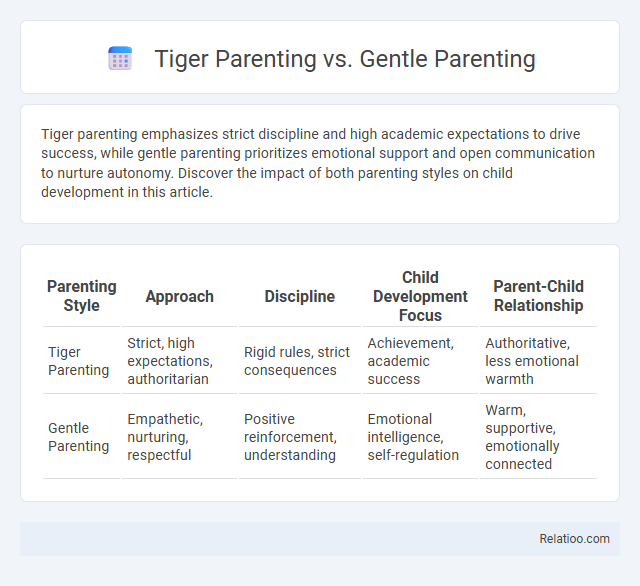Tiger parenting emphasizes strict discipline and high academic expectations to drive success, while gentle parenting prioritizes emotional support and open communication to nurture autonomy. Discover the impact of both parenting styles on child development in this article.
Table of Comparison
| Parenting Style | Approach | Discipline | Child Development Focus | Parent-Child Relationship |
|---|---|---|---|---|
| Tiger Parenting | Strict, high expectations, authoritarian | Rigid rules, strict consequences | Achievement, academic success | Authoritative, less emotional warmth |
| Gentle Parenting | Empathetic, nurturing, respectful | Positive reinforcement, understanding | Emotional intelligence, self-regulation | Warm, supportive, emotionally connected |
Understanding Tiger Parenting: Core Principles
Tiger parenting emphasizes high expectations, strict discipline, and a strong focus on academic excellence to foster achievement and resilience in children. This approach often involves intensive parental control, rigorous study schedules, and the belief that hard work and perseverance are key to success. Understanding these core principles helps differentiate tiger parenting from gentle parenting, which prioritizes emotional support and autonomy, while parental involvement broadly includes various engagement styles aimed at promoting child development.
Gentle Parenting Defined: Philosophy and Methods
Gentle parenting is a philosophy centered on empathy, respect, and understanding of your child's emotions and individuality rather than strict discipline or control. This approach emphasizes positive communication, consistent boundaries, and nurturing trust, encouraging emotional growth and self-regulation. Unlike tiger parenting's high demands or solely parental involvement methods, gentle parenting fosters a supportive environment that respects your child's developmental needs and promotes secure attachment.
Key Differences Between Tiger and Gentle Parenting
Tiger parenting emphasizes strict discipline, high expectations, and academic excellence, often involving a structured and authoritarian approach to child-rearing. Gentle parenting prioritizes empathy, open communication, and emotional support, fostering a nurturing environment that encourages autonomy and self-regulation. Parental involvement varies as tiger parents engage intensively in schooling and activities to ensure success, while gentle parents focus on emotional connections and collaborative problem-solving.
Cultural Influences on Parenting Styles
Cultural influences significantly shape the distinctions between Tiger parenting, Gentle parenting, and Parental involvement, with Tiger parenting often rooted in East Asian cultural values emphasizing discipline and academic excellence, while Gentle parenting reflects Western ideals prioritizing emotional support and autonomy. Your parenting approach may integrate aspects from these styles depending on cultural norms, societal expectations, and familial traditions that dictate child-rearing practices. Understanding these cultural contexts enhances your awareness of how parenting methods impact child development and interpersonal relationships.
Academic Outcomes: High Achievement vs. Holistic Growth
Tiger parenting often correlates with high academic achievement due to its strict discipline and high expectations, while gentle parenting nurtures holistic growth by fostering emotional well-being and creativity alongside academics. Parental involvement that balances firm guidance with emotional support tends to produce the best academic outcomes, enhancing both performance and personal development. Your child's success is maximized when academic rigor is combined with empathetic engagement, promoting both achievement and overall growth.
Emotional Impact on Children: Anxiety vs. Self-Esteem
Tiger parenting often leads to increased anxiety in children due to high pressure and strict expectations, whereas gentle parenting fosters self-esteem by promoting emotional support and understanding. Parental involvement that balances discipline with warmth can minimize anxiety and enhance your child's confidence, creating a nurturing environment for emotional growth. Understanding these dynamics helps you choose an approach that supports your child's mental well-being and emotional resilience.
Discipline Strategies: Strictness vs. Collaboration
Tiger parenting employs strict discipline strategies emphasizing high expectations and controlled environments, which can promote achievement but may increase stress. Gentle parenting prioritizes collaboration and empathy, encouraging self-regulation and open communication to foster mutual respect and emotional growth. Your approach to parental involvement shapes how discipline balances authority and support, ultimately impacting your child's development and behavior.
Long-term Effects: Adult Success and Well-being
Tiger parenting, characterized by strict discipline and high expectations, often leads to academic achievement but may increase stress and reduce emotional well-being in adulthood. Gentle parenting promotes emotional security and self-esteem, contributing to long-term psychological health and balanced success. Your approach to parental involvement that combines supportive engagement with appropriate boundaries fosters resilience, social competence, and sustained adult well-being.
Balancing Expectations and Empathy in Parenting
Tiger parenting emphasizes strict discipline and high achievement standards, often leading to pressure but fostering resilience, while gentle parenting prioritizes empathy and emotional support to nurture self-esteem and independence; achieving a balance involves integrating firm expectations with compassionate communication. Parental involvement that harmonizes accountability and understanding encourages children's motivation and emotional growth, reducing stress and improving academic and social outcomes. Effective parenting blends structured guidance with empathetic responsiveness to support holistic child development.
Which Parenting Style Is Right for Your Family?
Choosing the right parenting style depends on your family's unique dynamics and goals, balancing discipline with emotional support. Tiger parenting emphasizes high expectations and strict rules, while gentle parenting fosters empathy and open communication, and parental involvement highlights active participation in a child's education and activities. Understanding your child's temperament and your parenting values helps determine whether a firm, nurturing, or engaged approach best supports their development and well-being.

Infographic: Tiger parenting vs Gentle parenting
 relatioo.com
relatioo.com